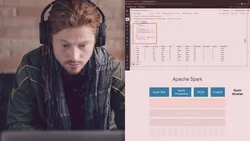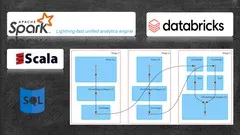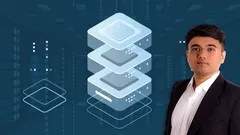
Predictive Analytics Using Apache Spark MLlib on Databricks 
This course provides an introduction to predictive analytics using Apache Spark MLlib APIs on Databricks. Participants will learn to understand and implement important techniques such as regression and classification. ▼
ADVERTISEMENT
Course Feature
![]() Cost:
Cost:
Free Trial
![]() Provider:
Provider:
Pluralsight
![]() Certificate:
Certificate:
Paid Certification
![]() Language:
Language:
English
![]() Start Date:
Start Date:
On-Demand
Course Overview
❗The content presented here is sourced directly from Pluralsight platform. For comprehensive course details, including enrollment information, simply click on the 'Go to class' link on our website.
Updated in [February 21st, 2023]
What does this course tell?
(Please note that the following overview content is from the original platform)
This course will teach you to understand and implement important techniques for predictive analytics such as regression and classification using Apache Spark MLlib APIs on Databricks.
The Spark unified analytics engine is one of the most popular frameworks for big data analytics and processing. Spark offers extremely comprehensive and easy to use APIs for machine learning which you can use to build predictive models for regression and classification and pre-process data to feed into these models. In this course, Predictive Analytics Using Apache Spark MLlib on Databricks, you will learn to implement machine learning models using Spark ML APIs. First, you will understand the different Spark libraries available for machine learning, the older RDD-based library, and the newer DataFrame based library. You will then explore the range of transformers available in Spark for pre-processing data for machine learning - such as scaling and standardization transformers for numeric data and label encoding and one-hot encoding transformers for categorical data. Next, you will use linear regression and ensemble models such as random forest and gradient boosted trees to build regression models. You will use these models for prediction on batch data. In addition, you will also see how you can use Spark ML Pipelines to chain together transformers and estimators to build a complete machine learning workflow. Finally, you will implement classification models using logistic regression as well as decision trees. You will train the ML model using batch data but perform predictions on streaming data. You will also use hyperparameter tuning and cross-validation to find the best model for your data. When you’re finished with this course, you’ll have the skills and knowledge to create ML models with Spark MLlib needed to perform predictive analysis using machine learning.
We consider the value of this course from multiple aspects, and finally summarize it for you from three aspects: personal skills, career development, and further study:
(Kindly be aware that our content is optimized by AI tools while also undergoing moderation carefully from our editorial staff.)
This course will teach learners to understand and implement important techniques for predictive analytics such as regression and classification using Apache Spark MLlib APIs on Databricks. Learners will gain an understanding of the different Spark libraries available for machine learning, the older RDD-based library, and the newer DataFrame based library. They will explore the range of transformers available in Spark for pre-processing data for machine learning - such as scaling and standardization transformers for numeric data and label encoding and one-hot encoding transformers for categorical data. Learners will use linear regression and ensemble models such as random forest and gradient boosted trees to build regression models. They will also use Spark ML Pipelines to chain together transformers and estimators to build a complete machine learning workflow. In addition, learners will implement classification models using logistic regression as well as decision trees. They will train the ML model using batch data but perform predictions on streaming data. They will also use hyperparameter tuning and cross-validation to find the best model for their data. By the end of the course, learners will have the skills and knowledge to create ML models with Spark MLlib needed to perform predictive analysis using machine learning.
[Applications]Learners will have the skills and knowledge to create ML models with Spark MLlib needed to perform predictive analysis using machine learning. Learners will be able to understand and implement important techniques for predictive analytics such as regression and classification using Apache Spark MLlib APIs on Databricks. They will also be able to explore the range of transformers available in Spark for pre-processing data for machine learning, use linear regression and ensemble models such as random forest and gradient boosted trees to build regression models, and implement classification models using logistic regression as well as decision trees. In addition, learners will be able to use Spark ML Pipelines to chain together transformers and estimators to build a complete machine learning workflow, and use hyperparameter tuning and cross-validation to find the best model for their data.
[Recommend Books]Advanced Analytics with Spark: Patterns for Learning from Data at Scale by Sandy Ryza, Uri Laserson, Sean Owen, and Josh Wills: This book provides an in-depth look at the Spark platform and its components, including Spark SQL, Spark Streaming, MLlib, and GraphX. It also covers advanced topics such as machine learning algorithms, data pipelines, and streaming analytics. This book will help you to understand the fundamentals of Spark and how to use it to build predictive models.
[Career Paths]1. Data Scientist: Data Scientists use predictive analytics to analyze large datasets and develop models to predict future outcomes. They use a variety of tools and techniques, including Apache Spark MLlib, to identify patterns and trends in data. Data Scientists are in high demand and the field is expected to continue to grow as organizations increasingly rely on data-driven decision making.
2. Machine Learning Engineer: Machine Learning Engineers use predictive analytics to develop and deploy machine learning models. They use Apache Spark MLlib to build and optimize models for a variety of applications, such as natural language processing, computer vision, and recommendation systems. Machine Learning Engineers are in high demand and the field is expected to continue to grow as organizations increasingly rely on machine learning to automate processes and make decisions.
3. Business Intelligence Analyst: Business Intelligence Analysts use predictive analytics to analyze data and develop insights that can be used to inform business decisions. They use Apache Spark MLlib to identify patterns and trends in data and develop models to predict future outcomes. Business Intelligence Analysts are in high demand and the field is expected to continue to grow as organizations increasingly rely on data-driven decision making.
4. Data Analyst: Data Analysts use predictive analytics to analyze data and develop insights that can be used to inform business decisions. They use Apache Spark MLlib to identify patterns and trends in data and develop models to predict future outcomes. Data Analysts are in high demand and the field is expected to continue to grow as organizations increasingly rely on data-driven decision making.
[Education Paths]1. Bachelor of Science in Data Science: This degree program focuses on the development of data-driven solutions to solve complex problems. It covers topics such as data mining, machine learning, predictive analytics, and data visualization. It also provides students with the skills to develop and deploy data-driven applications. This degree is becoming increasingly popular as businesses are looking for professionals who can use data to make informed decisions.
2. Master of Science in Artificial Intelligence: This degree program focuses on the development of intelligent systems that can learn from data and make decisions. It covers topics such as natural language processing, computer vision, robotics, and machine learning. It also provides students with the skills to develop and deploy AI-driven applications. This degree is becoming increasingly popular as businesses are looking for professionals who can use AI to automate processes and make decisions.
3. Master of Science in Business Analytics: This degree program focuses on the development of data-driven solutions to solve business problems. It covers topics such as data mining, predictive analytics, and data visualization. It also provides students with the skills to develop and deploy data-driven applications. This degree is becoming increasingly popular as businesses are looking for professionals who can use data to make informed decisions.
4. Doctor of Philosophy in Data Science: This degree program focuses on the development of data-driven solutions to solve complex problems. It covers topics such as data mining, machine learning, predictive analytics, and data visualization. It also provides students with the skills to develop and deploy data-driven applications. This degree is becoming increasingly popular as businesses are looking for professionals who can use data to make informed decisions.
Course Provider

Provider Pluralsight's Stats at AZClass
Pluralsight ranked 16th on the Best Medium Workplaces List.
Pluralsight ranked 20th on the Forbes Cloud 100 list of the top 100 private cloud companies in the world.
Pluralsight Ranked on the Best Workplaces for Women List for the second consecutive year.
AZ Class hope that this free trial Pluralsight course can help your Databricks skills no matter in career or in further education. Even if you are only slightly interested, you can take Predictive Analytics Using Apache Spark MLlib on Databricks course with confidence!
Discussion and Reviews
0.0 (Based on 0 reviews)
Explore Similar Online Courses

Design Tickets and Vouchers in Photoshop and Illustrator

Cloud Architecture

Python for Informatics: Exploring Information

Social Network Analysis

Introduction to Systematic Review and Meta-Analysis

The Analytics Edge

DCO042 - Python For Informatics

Causal Diagrams: Draw Your Assumptions Before Your Conclusions

Whole genome sequencing of bacterial genomes - tools and applications

Databricks Fundamentals & Apache Spark Core

Databricks Essentials for Spark Developers (Azure and AWS)

Microsoft Azure Databricks for Data Engineering
 Related Categories
Related Categories
 Popular Providers
Popular Providers
Quiz
 Submitted Sucessfully
Submitted Sucessfully
1. Which of the following is not a type of transformer available in Spark for pre-processing data for machine learning?
2. Which of the following is not a type of model used for regression?
3. Which of the following is not a type of model used for classification?
4. Which of the following is not a type of library available in Spark for machine learning?
5. What is the name of the unified analytics engine used in this course?
Correct Answer: Apache Spark


Start your review of Predictive Analytics Using Apache Spark MLlib on Databricks